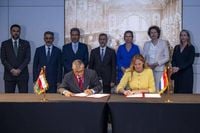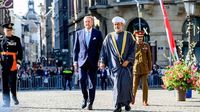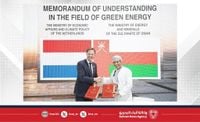On April 16, 2025, the Sultanate of Oman and the Kingdom of the Netherlands marked a significant milestone in their bilateral relations by signing three pivotal agreements focused on the production and export of green hydrogen. This development comes during the visit of Sultan Haitham bin Tarik to the Netherlands, highlighting the growing cooperation between the two nations in the energy sector.
The agreements were formalized in a ceremony attended by Sultan Haitham, who was received by King Willem-Alexander and Queen Maxima at the Royal Palace in Amsterdam. The discussions held during this visit revolved around enhancing collaboration in various sectors, including ports, logistics services, chemical industries, renewable energy, agriculture, food security, and cultural exchange.
Among the agreements, the first involves the establishment of the world's first commercial project for the export of liquefied green hydrogen, linking Oman, the Netherlands, and Germany. This innovative project is expected to significantly bolster Oman's position as a global hub for green hydrogen production and exportation, while also contributing to global energy security.
Key players in this landmark agreement include Omani companies such as "Hydrom" and "OQ," along with the port of Duqm. The project aims to facilitate the export of hydrogen from Duqm to Amsterdam, and subsequently to strategic centers in Germany, such as the port of Duisburg. This initiative is a crucial step towards establishing a reliable supply chain for green hydrogen, adhering to European Union standards for renewable fuel.
The project will utilize advanced marine transport technologies developed by the company "Ekoluog," ensuring efficient and secure transportation of the liquefied hydrogen. In Europe, plans are in place to create conversion stations at the port of Amsterdam, where liquefied hydrogen will be transformed back into its gaseous state for distribution to various industrial sectors in the Netherlands and Germany.
Oman's Minister of Energy and Minerals, Salem bin Nasser al-Aufi, emphasized the strategic importance of this collaboration, stating, "This cooperation represents a strategic step in Oman’s journey towards building an economy based on green hydrogen, linking our production capabilities with global markets and enhancing our readiness to lead the sector." This sentiment reflects a broader ambition within Oman to diversify its economy and reduce dependence on traditional energy resources.
The second and third agreements focus on developing the infrastructure necessary for transporting hydrogen and carbon dioxide through pipelines, and a partnership with the Dutch company Royal Vopak to develop storage projects for clean fuels and chemicals in the special economic zone in Duqm. These agreements are expected to lay the groundwork for a robust infrastructure that supports Oman’s aspirations in the energy sector.
As part of the efforts to create a comprehensive national system, the Omani government is keen on enhancing industries related to hydrogen, thereby strengthening investment opportunities and national capacities. The collaboration with the Netherlands is expected to attract international expertise and funding, facilitating Oman’s transition towards a sustainable energy future.
According to Dutch Minister of Climate and Green Growth, Sophie Hermans, this agreement is a “decisive step” in reinforcing bilateral relations, pointing out that Oman has a solid regulatory framework that makes it an attractive destination for investment in the green hydrogen sector. This partnership is not only about energy but also about fostering economic growth and job creation in Oman.
Oman aims to create new job opportunities, particularly for its youth, in sectors related to renewable energy, logistics, and chemical industries as a result of these agreements. The anticipated projects are poised to transform the economic landscape of Oman, aligning with the country’s commitments to carbon neutrality and economic diversification.
As the world increasingly shifts towards sustainable energy solutions, Oman’s proactive approach to establishing itself as a leader in the green hydrogen market underscores its commitment to contributing to global energy security while fostering economic development at home. The agreements signed with the Netherlands represent a significant leap forward in this ambitious vision.
In conclusion, the strategic agreements between Oman and the Netherlands signify a promising future for both nations, as they work together to harness the potential of green hydrogen and develop a sustainable energy infrastructure. This collaboration not only enhances bilateral ties but also positions Oman as a key player in the global green energy landscape.







